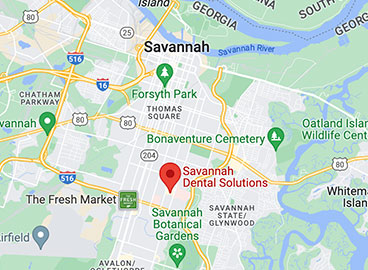At Savannah Dental Solutions, we understand that dental discomfort can be worrisome. That’s why we’re here to guide you through understanding one of the most common restorative procedures—root canal treatments. If you’ve been experiencing persistent dental pain or certain unexplained symptoms, you might be wondering if you need this procedure. By recognizing the warning signs early on, you can take the necessary steps to preserve your oral health and restore your comfort.
Here, we’ll explore the key signs that could indicate you need root canal treatment, how the procedure works, and why there’s no need to fear it. Let’s jump in to uncover what you need to know.
What Is a Root Canal Treatment?
Root canal treatment is a procedure designed to save a tooth that has become severely infected or damaged inside. At the core of each tooth lies the dental pulp, a soft tissue that contains nerves and blood vessels. When the pulp becomes infected due to deep decay, cracks, chips, or trauma, it causes pain and swelling. Left untreated, the infection can spread, leading to further complications, such as abscesses or tooth loss.
During a root canal procedure, the infected pulp is removed, and the inside of the tooth is carefully cleaned and sealed to prevent future infection. While it may sound complex, modern advances in dentistry make this treatment highly effective and comfortable for patients.
Key Signs You Might Need a Root Canal
1. Persistent Tooth Pain
One of the telltale signs of needing a root canal is ongoing tooth pain that doesn’t go away. This discomfort may range from a dull ache to sharp, severe pain, and it can arise in different situations—when you chew, apply pressure, or even without a trigger. Persistent pain often indicates the pulp inside your tooth is infected or damaged.
2. Sensitivity to Heat or Cold
Another common symptom is heightened sensitivity to hot or cold foods and beverages. Does your tooth throb when sipping on coffee or biting into ice cream? Sensitivity that lingers long after exposure to temperature changes may mean that nerves inside the tooth are inflamed or dying.
3. Swollen or Tender Gums
Swelling around a specific tooth could signal an underlying infection. This inflammation may present as sore, tender gums or swelling that feels unusual to the touch. Sometimes, you might also notice a small pimple-like bump on the gums near the affected tooth. Known as a dental abscess, this bump can release unpleasant-tasting fluid, which indicates an infection has spread to surrounding tissue.
If you observe these symptoms, seeking prompt attention is crucial to prevent the infection from worsening.
4. Discoloration of the Tooth
A tooth that appears darker or more discolored than the surrounding teeth could be a sign of internal damage. This discoloration typically results when the pulp becomes infected and starts to deteriorate. While routine whitening treatments can’t address this problem, a root canal can restore the tooth’s functionality.
5. Pain When Chewing or Touching the Tooth
Have you started avoiding chewing on one side because a specific tooth feels tender or sore? Painful chewing, especially when applying even slight pressure, may point to nerve damage or infection inside the tooth. This type of discomfort shouldn’t be ignored, as it often signals a deeper dental issue.
6. A Chipped or Cracked Tooth
A traumatic injury or biting down on something hard can cause a tooth to chip or crack, exposing the pulp to harmful bacteria. If left untreated, bacteria can invade the inside of the tooth, leading to infection or decay. Through a root canal treatment, we can address the damage and protect your tooth from further complications.
7. Deep Decay
Sometimes, a cavity goes unnoticed and progresses to the point of affecting the deeper layers of the tooth. If you have deep decay that extends to the pulp, a routine filling may no longer suffice. A root canal is often the recommended solution to remove the decay and save the tooth.
How a Root Canal Can Help
While the symptoms described above may seem intimidating, the good news is that root canal treatment is highly effective at resolving these issues. Once the infected pulp is removed, your tooth is cleaned and sealed, ensuring long-term protection against reinfection. Additionally, the procedure alleviates the pain and discomfort caused by the infection, helping you regain normal function and comfort.
It’s worth noting that modern root canals are nothing like the procedures you might have heard about years ago. With today’s advanced techniques and local anesthesia options, the process is comfortable and minimally invasive. At Savannah Dental Solutions, we take extra care to ensure your experience is as stress-free as possible. If dental anxiety is a concern, we’ll walk you through every step to help you feel confident.
Preventing Root Canal Treatment
While root canal treatments are a safe and effective way to save a tooth, prevention is always better. Here are a few simple tips to protect your oral health and reduce the likelihood of needing a root canal:
- Maintain a Strong Oral Hygiene Routine. Brush your teeth twice a day, floss daily, and use a fluoride mouthwash to keep bacteria at bay.
- Visit the Dentist Regularly. Routine dental check-ups allow us to catch potential issues early on before they require more extensive treatment.
- Address Damage Promptly. If you notice a cracked or chipped tooth, don’t ignore it. Prompt treatment can prevent bacteria from entering the tooth.
- Protect Your Teeth. If you grind your teeth or play contact sports, consider wearing a custom nightguard or sports mouthguard to shield your teeth from damage.
Frequently Asked Questions
Does a root canal procedure hurt?
At Savannah Dental Solutions, we prioritize your comfort throughout the process. Thanks to modern techniques and effective anesthesia, root canal treatments are typically no more uncomfortable than getting a routine filling. You can rest assured that our team will make every effort to ensure a pain-free experience.
How long does a root canal procedure take?
The length of your appointment depends on the complexity of your individual case, but most root canal treatments can be completed in one to two visits. During your consultation, we’ll explain the process and provide a clear timeline for your treatment so you know exactly what to expect.
At Savannah Dental Solutions, we’re proud to offer compassionate care tailored to your needs. Our treatments are designed to save your natural teeth and restore your oral health with minimal discomfort. We’re here to answer any questions you might have and provide the reassurance and guidance you need. Contact us today to schedule an appointment.






